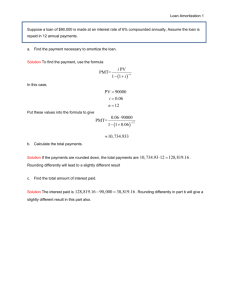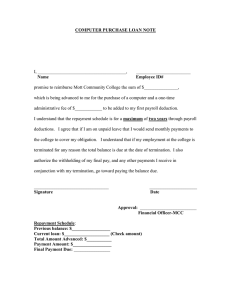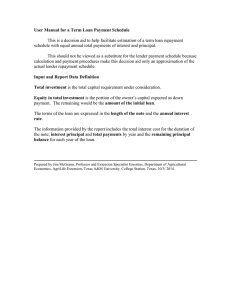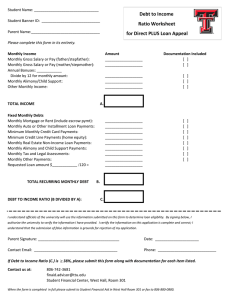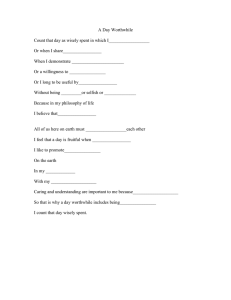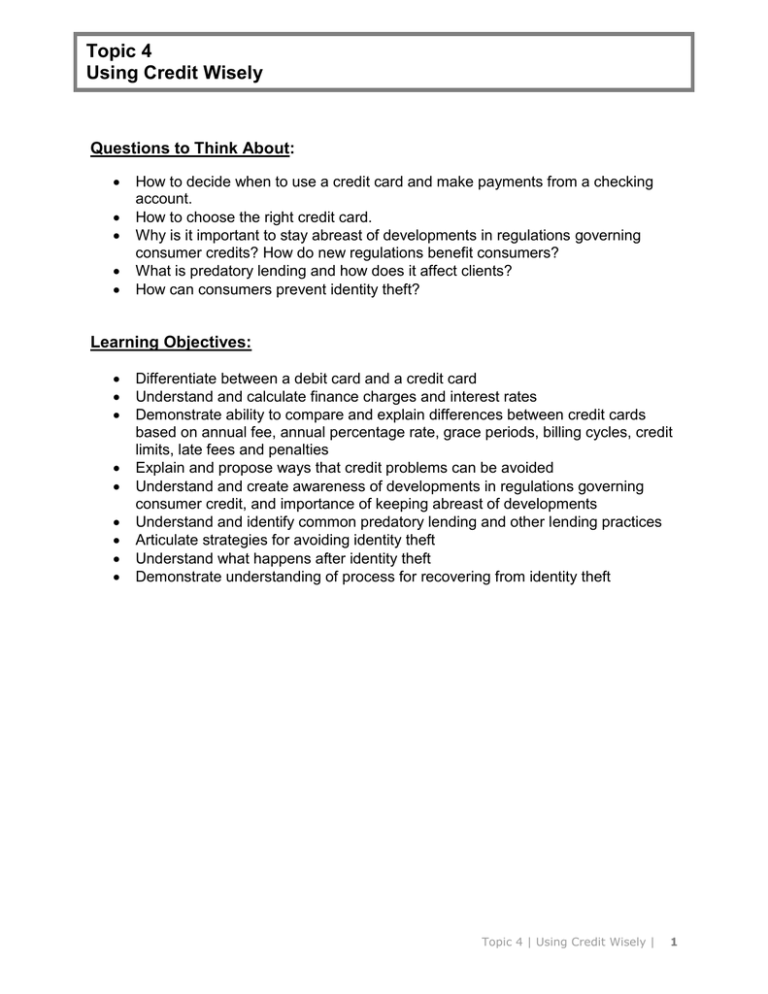
Topic 4
Using Credit Wisely
Questions to Think About:
How to decide when to use a credit card and make payments from a checking
account.
How to choose the right credit card.
Why is it important to stay abreast of developments in regulations governing
consumer credits? How do new regulations benefit consumers?
What is predatory lending and how does it affect clients?
How can consumers prevent identity theft?
Learning Objectives:
Differentiate between a debit card and a credit card
Understand and calculate finance charges and interest rates
Demonstrate ability to compare and explain differences between credit cards
based on annual fee, annual percentage rate, grace periods, billing cycles, credit
limits, late fees and penalties
Explain and propose ways that credit problems can be avoided
Understand and create awareness of developments in regulations governing
consumer credit, and importance of keeping abreast of developments
Understand and identify common predatory lending and other lending practices
Articulate strategies for avoiding identity theft
Understand what happens after identity theft
Demonstrate understanding of process for recovering from identity theft
Topic 4 | Using Credit Wisely |
1
UNDERSTANDING CREDIT AND DEBT
Credit is money that you borrow to pay for things, usually referred to as a loan. You
make a promise to pay back what you borrowed, but you are charged interest and fees.
Credit is not “free money”. Credit allows you to buy things when you don’t have the cash,
but interest and fees cost you more in the long run.
Using credit responsibly and having a good credit history is important. Lenders,
employers, landlords and other providers may check your credit history to determine
your trustworthiness in paying back debt.
Establish
Maintain
Improve/Repair
Creating a link to the
financial system
Pay bills on time
Start paying bills on time
Take out a secured loan or
credit card
Try not to carry a
balance on your credit
cards
Create a payment plan to keep you
on track with your payments
Open a credit card
(be responsible)
Avoid credit cards with
high interest rates
Address bad debt issues-negotiate
with collectors (we can help)
Pay bills on time
Correct errors on your credit report
Topic 4 | Using Credit Wisely |
2
Topic 4 | Using Credit Wisely |
3
CREDIT CARD PROTECTIONS
The Credit Card Accountability Responsibility and Disclosure Act of 2009
Credit Card companies must provide consumers with clear and understandable forms and
statements
Rules regarding rate increases
Special protections for students and young consumers
Credit card companies must provide a 45-day written notice before changing the
interest rate of future balances or making significant changes to the terms of a credit card
agreement
Notice gives consumers the right to cancel and avoid fee increase
If consumer cancels, he/she must repay the debt either over five years or by making monthly
payments of up to twice the current minimum payment
Exceptions:
45-day notice is NOT required if change is due to a variable rate
The expiration of a promotional rate
Failure to comply with the terms of a “workout” or “hardship” agreement
Credit card companies cannot raise interest rates on existing balances
Exceptions:
o
o
o
o
Does NOT apply when minimum payment is 60 days late
The change is due to a change in the index tied to a variable rate
A promotional rate expires
The consumer fails to comply with the terms of a “workout” or “hardship” agreement
Interest Rates in First Year: Credit card companies cannot raise the rates for future
purchase for the first year the account is open
Exceptions:
o
o
o
o
Does NOT apply when minimum payment is 60 days late
The change is due to a change in the index tied to a variable rate
A promotional rate expires
The consumer fails to comply with the terms of a “workout” or “hardship” agreement
Introductory promotional rates must last at least 6 months and the go-to rate after expiration
must be disclosed
Reasonable Time to Make Payments: Your bill must be sent within 21 days before the
payment is due
Reasonable Payment Dates: No weekend due dates, due dates that change each month,
and payment deadlines that fall in the middle of the day
Topic 4 | Using Credit Wisely |
4
Time to Repay
Credit Card Statement must disclose:
How long it will take to pay off the balance and the total interest if consumer only
makes minimum payments each month
How much the consumer would have to pay each month to pay off the balance in
three years
Over-the-Limit Fees: No fees for going over the card limit may be charged unless the
consumer opts into over-the-limit coverage
Upfront Fees: Fees in the first year (annual or usage) must not exceed 25% of the credit
limit (except for late fees, over-the-limit fees, or returned-payment fees)
Fees for Making Payments: Cannot charge a separate fee for making payments via mail,
electronic transfer, telephone authorization or other means, unless the payment involves an
expedited service by a representative of the creditor, such as same day service
Fees and Penalties: Must be reasonable and proportional
Late fees: Capped at $25 or the minimum payment missed whichever is lower
Cure Penalty Interest Rates Triggered by Late Payments: If a consumer was 60 days
late making payments and a legal rate increase was made, the initial lower rate must be
reinstated if the cardholder makes 6 consecutive on-time payments
Re-Evaluation of Other Rate Increases: For accounts that have had rates increased after
January 1, 2009, creditors must review accounts every 6 months to determine whether risk
factors and market conditions have changed and determine whether to reduce the APR
Protections for Young Adults Under Age 21
Credit card may not be issued to an applicant unless he/she provides evidence of
independent means to make payments or has a co-signer 21 years or older with
demonstrated ability to repay
Cannot offer tangible items (like Frisbees or t-shirts) on college campuses or at events
sponsored by colleges to induce students to apply for credit cards
Colleges must disclose marketing relationships
Credit bureaus are prohibited from providing credit card companies with young people’s
credit reports unless they have had expressly consented
Topic 4 | Using Credit Wisely |
5
HIGH-COST “FRINGE” LENDING
Other Forms of Credit
Over the past decade, businesses that specialize in providing alternative financial products
and services to low-income individuals who have limited access to mainstream financial
institutions have proliferated. These companies include payday lenders, pawn shops, rent-toown businesses, servicers among others.
As counselors, it is important to advise clients against using these types of predatory services
and encourage them to use safe and affordable financial services.
Informal Lending: Non-institutional lenders/loan sharks
Refund Anticipation Loans: Usually a high-interest rate, short-term loan secured by using
a taxpayer’s expected tax refund, and supposedly offers customers immediate access to
funds while waiting for the tax refund
Rent to Own: Consumer rents items, such as furniture or appliances, to own by the end of
the rental period
Pawnbrokers: Licensed to lend money at a legally specified rate of interest using articles of
personal property left as security
Payday Loans: Small, short-term loan used borrower's expenses until his or her next
payday (may be illegal in some jurisdictions)
Refund Anticipation Loans (RAL)
“Instant,” “Rapid” or “24 Hour Refunds”
One- to two-week loans made by banks and facilitated by tax preparers, secured by
taxpayer’s anticipated refund
Often carry triple digit APRs and expose taxpayers to risk of unpaid debt if refund does not
arrive as expected
Offer little benefit to consumers
When tax return filed electronically, can arrange direct deposit in as little as 8 days
Topic 4 | Using Credit Wisely |
6
Rent to Own Stores
Rent-to-own (RTO) stores offer a range of new and used products (appliances, furniture,
computers, electronics) for lease with option to purchase item at end of rental agreement
Typically no down payment or credit check required
Often inflate “cash prices” charged for merchandise, then offer long-term leases with low
weekly or monthly payments that mask final price
RTO customers routinely pay effective annual interest rates of 100% or higher
Many customers complain that item rented are misrepresented as new when they are used
Pawnbrokers
Also known as collateral loan brokers, lend money to consumers in return for items of value
ranging from jewelry and electronics to household goods
Usually lend less than one-half the value of property
Washington RCW 19.60.060 permits pawnbrokers to charge interest and receive rates for
money on the security of personal property actually received in a pledge.
Example: the amount loaned from $100.00 or more - interest at the rate of three percent for
each thirty-day period to include the loan date. In addition a fee for the preparation of loan
documents, pledges, or reports may be charged, plus a storage fee.
Source: http://apps.leg.wa.gov/RCW/default.aspx?cite=19.60.060
Must be licensed by the Department of Licensing.
Topic 4 | Using Credit Wisely |
7
LOOK OUT FOR:
Using virtual account number provided by credit
cards companies or banks
ATM’s off the street that may be rigged to copy
your credit card number.
Topic 4 | Using Credit Wisely |
8
© January 23, 2013
Cities for Financial Empowerment Fund
All rights reserved.
Topic 4 | Using Credit Wisely |
9
Topic 4 Exercise #1
Role Play
Two volunteers will play the roles of Marta and Bobby and two will play the roles of cocounselors for Marta and Bobby.
Case Study
Marta’s great aunt has just passed away, and left her with $250,000 in life insurance proceeds.
Marta and Bobby make an appointment to see you as their financial counselor, and ask you for
advice, how would you advise them to apply the insurance proceeds? What kinds of items
should they be considering to pay off first?
Topic 4 Exercise #2
What would you advise Marta and Bobby in the following situation?
Case Study
Marta and Bobby feel that they are finally on their way to being able to take control of their lives
now that they have received the inheritance from Marta’s aunt, and have paid off debt, and have
set some funds aside for the future.
One day, Bobby was home and received a phone call at 10 pm from a company claiming that
Marta owed them $100,000. The next morning the caller phoned at 6 am demanding to speak to
Marta. Marta answered the phone and decided to hang up and ignore it believing it was a crank
call.
That evening, at midnight the caller phoned again. This time Bobby told him they were going to
call the police if he did not stop calling.
3 months later, Marta received a call from her bank indicating that all of her funds in all of the
accounts that she and Bobby had, were garnished due to a judgment obtained against her in
upstate New York. The plaintiff, a loan company had sued her for $100,000 plus interest, based
on a personal loan and promissory note that was in default for over a year.
Marta has never heard of the loan company, and when she called the attorneys, was told that
she signed the agreement 18 months ago, and the name, social security number and date of
birth were correct, but she had never lived at the address they had for her. They said they had a
copy of the cancelled check with the loan proceeds, and that she deposited it into an account
she had upstate.
She and Bobby hurry down to FEC to see you. Their rent and utility payment checks, along with
their credit card payment checks all bounced. Now everyone was bombarding them with calls,
letters and e-mails. They were penniless.
Topic 4 | Using Credit Wisely | 10

